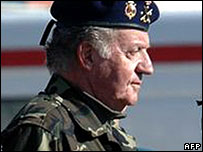BBC News
|
Friday, 4 January 2008 Spain’s fast-living king turns 70 As King Juan Carlos turns 70, the BBC’s Steve Kingstone in Madrid profiles the much-admired – and occasionally controversial – monarch. The King at work Instead, just days shy of his 70th birthday, King Juan Carlos paid a surprise New Year’s Eve visit to Spanish soldiers serving at a base in Afghanistan. The visit was typical of a king who has always taken pride in an action-man image. A love of skiing, sailing, karate, fast cars, motorbikes and helicopters figure prominently on the royal CV. Getting old quietly does not. How many other reigning monarchs would publicly tell Venezuela’s President Hugo Chavez to “shut up,” as Juan Carlos did during last November’s Ibero-American summit in Chile? Ringtone hit Many Spaniards applauded him. Their king had slapped down the combative Venezuelan on the world stage, and audio of the royal outburst quickly became a dance remix and a best-selling ringtone. Spanish royal commentator Jaime Penafiel “His majesty is a formidable personality but nice with it,” says Jaime Penafiel, a veteran royal watcher and former editor of Hola magazine. “Sure, what he said to Chavez wasn’t very regal; but he reacted viscerally when provoked, as all Spaniards do.” Juan Carlos de Borbon was born in Rome on 5 January 1938. His grandfather, King Alfonso XIII, had fled Madrid seven years earlier, and civil war was raging in Spain. The victorious general, Francisco Franco, would ensure that Spain remained monarch-free throughout his four-decade dictatorship. Franco’s protege At the age of 10, “Juanito” was sent to Madrid, where he was educated under the eagle eye of Franco, who saw the boy as a more suitable and malleable successor than his exiled father, Don Juan. Spain’s King Juan Carlos, Queen Sofia and family in January 1975 On Franco’s death in November 1975, the newly crowned King Juan Carlos – then aged 37 – swore allegiance to the principles of his apparent mentor. But the young king’s place in history would lie in the speed and courage with which he helped dismantle the Francoist state. In 1976 Juan Carlos chose as his prime minister Adolfo Suarez, a reformer who would lead the transition to democracy. A year later, the king supported the legalisation of the Spanish Communist Party, while in 1981 he would famously defend Spain’s infant democracy during an attempted coup by army officers. “There’s a deep-rooted feeling of gratitude for the king’s role in the transition to democracy,” explains Charles Powell, a historian and royal biographer. Lieutenant Colonel Antonio Tejero Molina, who attempted a coup in 1981 “Polls show that he is the individual to whom democratisation is most closely attributed, and the sense of gratitude cuts across class and ideological lines.” So much so that, in May 2007, the king was voted the greatest Spaniard of all time in a poll run by the Antenna 3 television channel. He beat the writer, Miguel Cervantes, into second place, with Franco 23rd on the list. Under attack But over the past 12 months there have been rumblings of a debate about the relevance and value of the monarchy to 21st-Century Spain. A sizeable tremor struck last September, when Catalan students publicly burned photographs of Juan Carlos and Queen Sofia. They viewed the king as the symbol of an artificially created Spanish state, and a conviction for “insulting the monarchy” gave publicity to their cause. The episode led to a rare political intervention by the king who, during a university speech, defended the parliamentary monarchy forged after the death of Franco. But the king was also being targeted from the right – notably by the outspoken Catholic radio commentator, Federico Jimenez Losantos, who called on Juan Carlos to abdicate in favour of his son, Crown Prince Felipe. Royal future There is little hard evidence of any widespread republican sentiment. In one recent poll, 69% of respondents said a parliamentary monarchy was the “ideal” political system for Spain, while 22% preferred a republic. Nonetheless, November’s Hugo Chavez encounter – although admired by many Spaniards – added to the sense of an “annus horribilis” for Juan Carlos. Spanish Crown Prince Felipe with Princess Letizia The incident caused some diplomatic embarrassment for the government, and raised questions about the king’s advancing years. “The biggest challenge ahead is the succession,” explains Mr Powell. “Juan Carlos will always remain popular because of his vital role in the past, but the question is how can he transfer some of that capital to Prince Felipe?” Royal watchers say there is little prospect of Juan Carlos abdicating, which leaves Crown Prince Felipe – approaching his 40th birthday – in a difficult position. Much like Britain’s Prince Charles, Felipe has sought to make his mark on topical issues such as the environment and immigration; but he remains essentially in the shadow of his more popular father. The veteran commentator, Jaime Penafiel, foresees turbulence ahead. “We’ve got a monarchy, but not monarchists,” he says. “Spaniards are ‘Juan Carlistas’ – they support the person, not the institution. And that’s a risk: it remains to be seen if they’ll take to Felipe.” |






Pentru a putea trimite un comentariu, trebuie sa bifați "Am citit și sunt de acord cu Politica de confidențialitate"